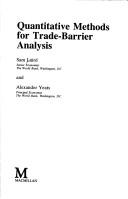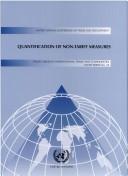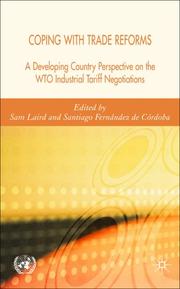| Listing 1 - 6 of 6 |
Sort by
|

ISBN: 0333511433 Year: 1990 Publisher: Basingstoke Macmillan
Abstract | Keywords | Export | Availability | Bookmark
 Loading...
Loading...Choose an application
- Reference Manager
- EndNote
- RefWorks (Direct export to RefWorks)
Book
ISBN: 9780415584029 Year: 2011 Publisher: Abingdon Routledge
Abstract | Keywords | Export | Availability | Bookmark
 Loading...
Loading...Choose an application
- Reference Manager
- EndNote
- RefWorks (Direct export to RefWorks)
Foreign trade promotion --- International Trade Center (U.S.) --- Developing countries --- United States --- Foreign economic relations
Book
ISBN: 0814750494 Year: 1990 Publisher: New York (N.Y.) : New York university press,
Abstract | Keywords | Export | Availability | Bookmark
 Loading...
Loading...Choose an application
- Reference Manager
- EndNote
- RefWorks (Direct export to RefWorks)

ISBN: 9211125553 Year: 2002 Publisher: New York (N.Y.): United Nations
Abstract | Keywords | Export | Availability | Bookmark
 Loading...
Loading...Choose an application
- Reference Manager
- EndNote
- RefWorks (Direct export to RefWorks)
Non-tariff trade barriers --- Statistical methods. --- Non-tariff distortions of trade --- Nontariff trade barriers --- Protectionism --- Tariff --- Statistical methods

ISBN: 0230004725 Year: 2006 Publisher: Basingstoke Palgrave
Abstract | Keywords | Export | Availability | Bookmark
 Loading...
Loading...Choose an application
- Reference Manager
- EndNote
- RefWorks (Direct export to RefWorks)

ISBN: 9211126762 9789211126761 Year: 2006 Volume: 30 Publisher: New York and Geneva United Nations
Abstract | Keywords | Export | Availability | Bookmark
 Loading...
Loading...Choose an application
- Reference Manager
- EndNote
- RefWorks (Direct export to RefWorks)
"Tariffs for industrial products are a key element of the ongoing WTO negotiations. However, rather than clarifying the issues, the framework text agreed on 1 August 2004 leaves considerable uncertainty about the future direction of the talks. According to one view, the negotiations are back at first base, with little progress in evidence since the Fifth WTO Ministerial Conference, held in Cancún. Others see the texts as the basis for an ambitious approach to tariff cutting. The more ambitious proposals imply increased imports, lower tariff revenues, some labor market adjustments and reduced output in some key sectors in some developing regions. Furthermore, the main proposals do not fully resolve problems of tariff escalation and peaks. Proposals that take greater account of the need for special and differential treatment for developing countries seem less threatening and more likely to satisfy the wishes of the growing number of WTO members from developing countries. A successful outcome requires that the main focus be on high tariffs and market entry conditions in respect of products of export interest to developing countries. In addition, some way needs be found to assist some developing countries in coping with the likely adjustment costs of liberalization."--Publisher's description
Tariff --- Free trade --- 330.35 --- 338 --- 575.08:577.21 --- BPB0605 --- Economische groei. Kwantitatieve toename. Technische vooruitgang --zie ook {338.09} --- Economische situatie. Economische structuur van bepaalde landen en gebieden. Economische geografie. Economische produktie.economische produkten. Economische diensten --- Genetic engineering, genetic manipulation, recombinant DNA --- 575.08:577.21 Genetic engineering, genetic manipulation, recombinant DNA --- 338 Economische situatie. Economische structuur van bepaalde landen en gebieden. Economische geografie. Economische produktie.economische produkten. Economische diensten --- 330.35 Economische groei. Kwantitatieve toename. Technische vooruitgang --zie ook {338.09} --- Ad valorem tariff --- Border taxes --- Customs (Tariff) --- Customs duties --- Duties --- Fees, Import --- Import controls --- Import fees --- Tariff on raw materials --- Commercial policy --- Indirect taxation --- Revenue --- Customs administration --- Favored nation clause --- Non-tariff trade barriers --- Reciprocity (Commerce) --- Free trade and protection --- Trade, Free --- Trade liberalization --- International trade
| Listing 1 - 6 of 6 |
Sort by
|

 Search
Search Feedback
Feedback About UniCat
About UniCat  Help
Help News
News